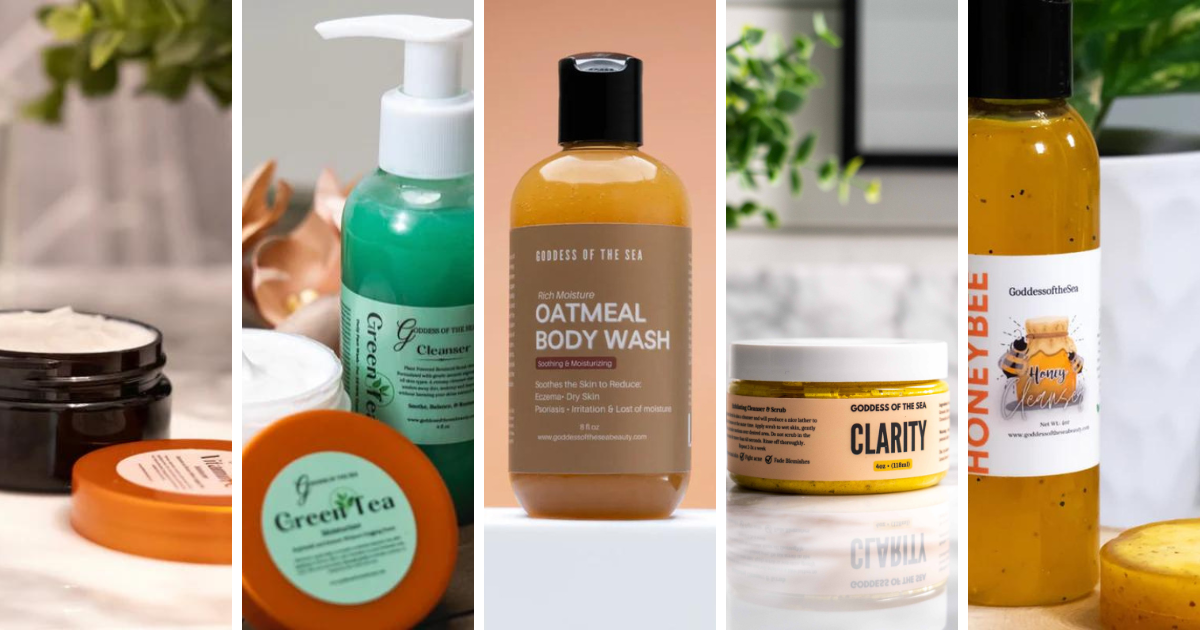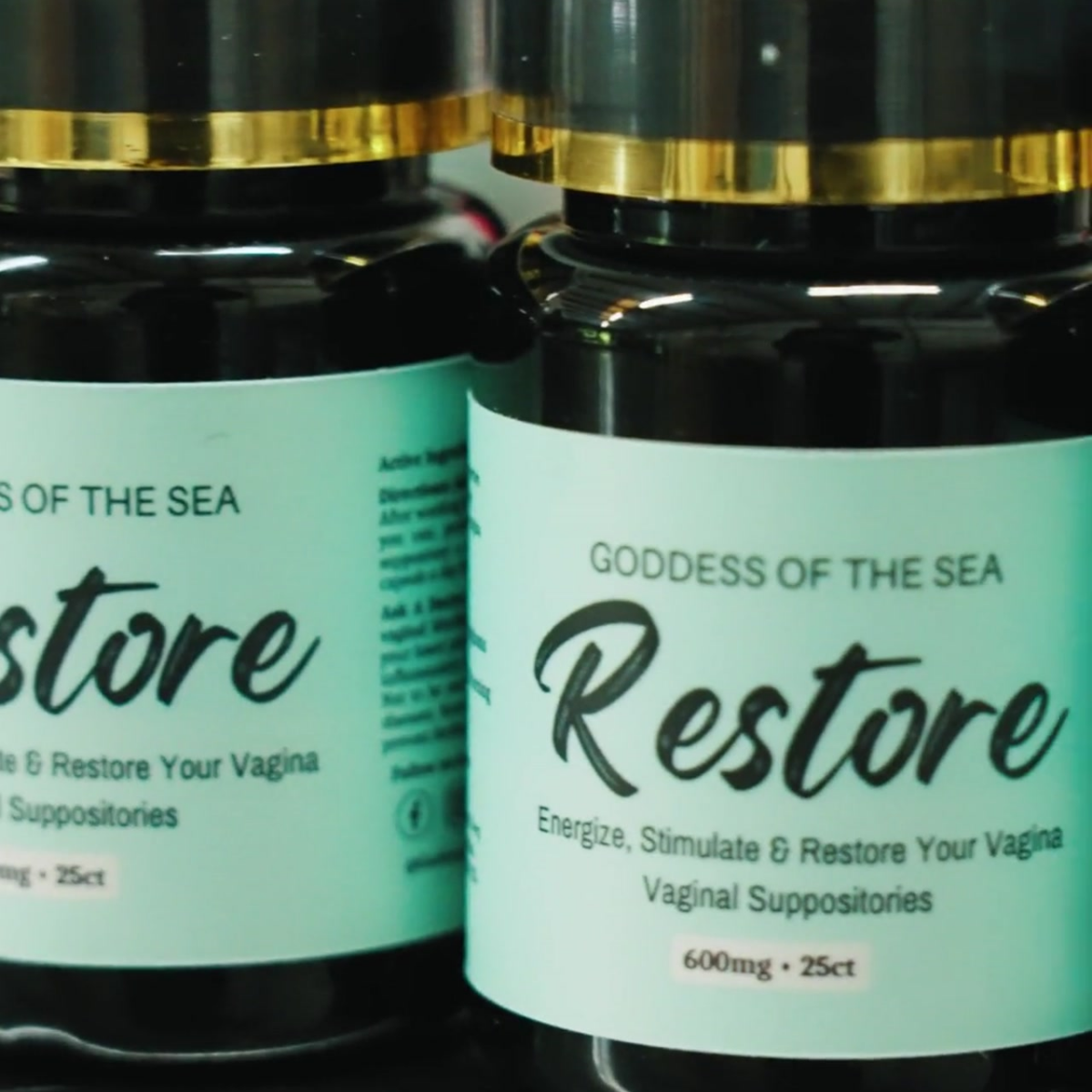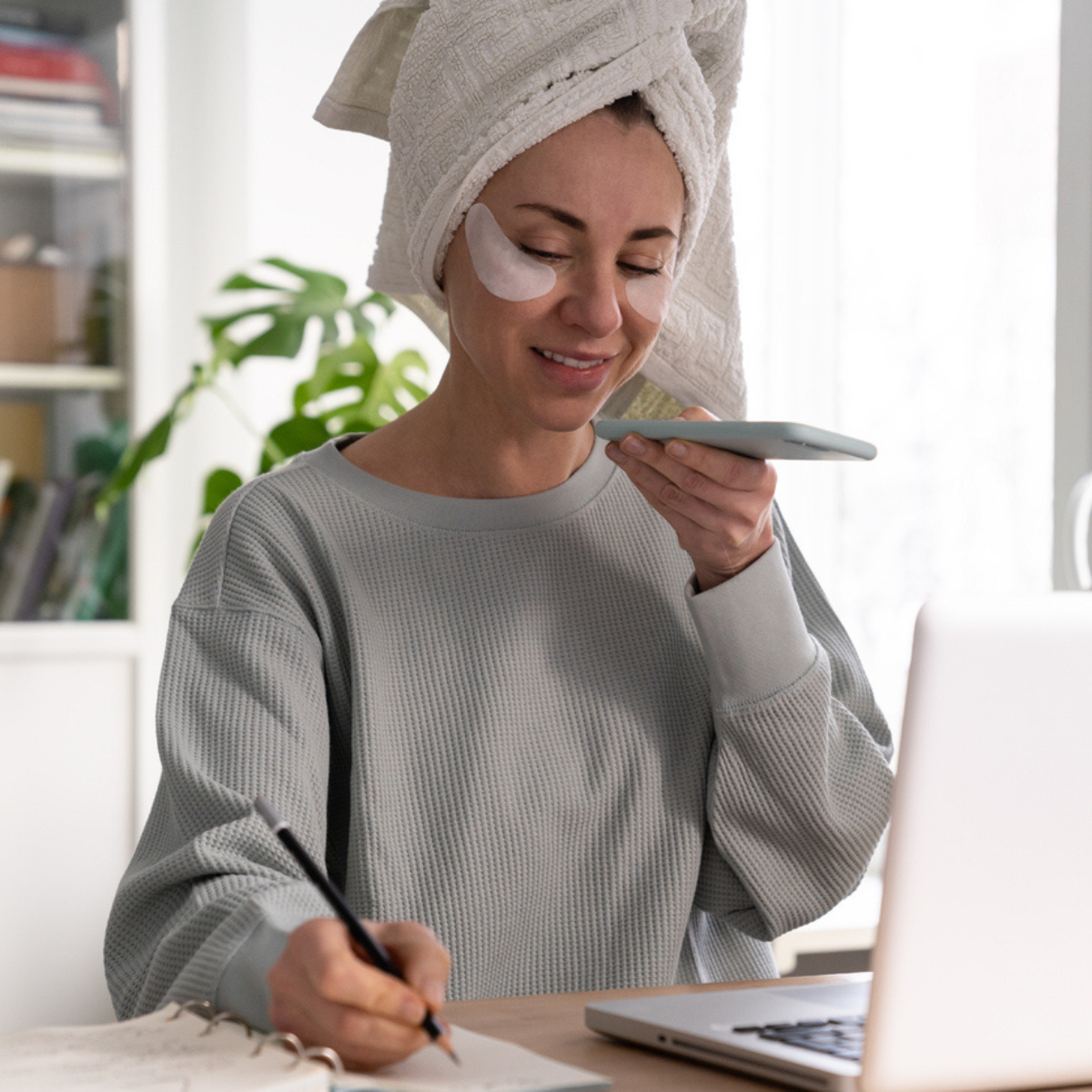Hi, Goddesses! Ready for summer? So are we. To help you get your skin glowing from the inside out, let’s talk about changing your winter skincare routine into one that works for summer.
Understanding Seasonal Skincare Needs
Winter often leaves our skin parched and begging for an extra layer of hydration. The cold, dry air pulls water from our skin, leading to dryness, flakiness, and sometimes even sensitivity. Your winter skincare, therefore, should center around deep hydration and barrier repair with rich creams and serums.
However, as the year turns towards summer, the sun's warmth, the humidity in the air, and the extended daylight hours introduce new challenges and needs for your skin.
Because of all this, the summer calls for a change in your skincare routine.
The drawbacks of sticking to your winter skincare routine
In winter, your skin craves dense formulations to combat dryness and lock in moisture. However, as temperatures rise and humidity increases, these products can lead to clogged pores and breakouts.
The main issue with continuing winter skincare products into summer is their potential to overwhelm your skin. Winter products are designed to create a barrier against the harsh winter environment.
But in summer, this barrier can trap sweat, oil, and dirt, creating issues like acne, blackheads, and other forms of congestion. This is particularly problematic if you have combination or oily skin or find your skin's oil production increases with the heat.
Additionally, your skin's concerns in summer extend beyond just increased oiliness. The elevation in sun exposure during these months poses a significant risk of UV damage. Winter skincare routines typically lack SPF protection and antioxidants to counter these effects.
While some winter products may contain SPF, the levels are often not sufficient for prolonged summer exposure, nor are they formulated to be sweat and water-resistant, which is crucial for effective summer protection
Ignoring the need to switch from winter to summer skincare routines can also reduce the effectiveness of your skincare products against summer-specific concerns like increased sweat and the need for more frequent cleansing. The formulation of winter products is not designed to address these issues, potentially leading to a build-up of impurities and an imbalance in your skin's natural protective barrier.
Your Summer Skincare Routine

Embracing summer means adapting your skincare to meet the season's demands to keep your skin radiant. Here are some tips to smoothly transition your skincare routine to accommodate the warmer, humid weather, ensuring your skin stays balanced, protected, and glowing.
Choose lighter moisturizers and serums
- Opt for lighter, hydrating options that won't weigh down your skin, like our Vitamin C Moisturizer or Green Tea Moisturizer.
- Gel-based or lightweight moisturizers provide essential hydration without contributing to clogged pores or breakouts.
Exfoliate regularly
- Winter skin can accumulate layers of dead skin cells. Exfoliating these away as part of your transition to summer skincare is crucial for boosting the efficacy of your summer products.
- Opt for gentle exfoliators like oatmeal soap or jojoba beads. At Goddess of the Sea, we particularly love our turmeric facial and body scrub, Clarity, for softer, smoother, brighter summer skin.
Wear sunscreen
- Applying sunscreen should be a non-negotiable step in your daily routine, regardless of whether you're spending the day indoors or out.
- Protecting your skin from UVA and UVB rays is crucial to prevent premature aging, hyperpigmentation, and other sun-induced damage.
Use antioxidants and after-sun care
- After-sun care products help soothe and repair your skin to soothe the effects of prolonged sun exposure and keep your skin healthy and resilient.
- Incorporating products with antioxidants offers additional protection against environmental stressors, including sun exposure.
Adjust your facial cleanser
- With increased sweat and oil production in summer, adjusting your cleanser can help manage these changes without stripping your skin of its natural oils.
- Opt for a gentle, foaming cleanser that effectively removes impurities, leaving your skin fresh and clear, like turmeric soap or our Green Tea Facial Cleanser.
Special Summer Skincare Tips
Incorporating these elements into your summer skincare routine can significantly enhance your skin's health, appearance, and resilience against seasonal challenges.
- Hydrating mists: Hydrating mists offer an instant refreshment and boost of hydration to your skin, perfect for those hot and humid days. With ingredients ranging from hyaluronic acid to plant extracts, they can also serve as a midday pick-me-up to rejuvenate your skin and restore moisture balance.
- Vitamin C products: Vitamin C products (like moisturizers, cleansers, and serums) act as a potent antioxidant, protecting your skin against environmental aggressors, including sun damage. They also significantly brighten your complexion and reduce fine lines and wrinkles by promoting collagen production.
- Aloe vera products: After a long day under the sun, aloe vera can provide immediate relief to sunburned or irritated skin, thanks to their cooling and anti-inflammatory effects. Whether in the form of gels, creams, or direct from the plant, aloe vera helps to repair and hydrate your skin.
- Stay hydrated: Drinking ample water throughout the day ensures that your skin remains hydrated from the inside out, complementing the effects of hydrating mists and moisturizers.
- Wear protective clothing: Protective clothing, such as wide-brimmed hats and sunglasses, can provide an additional barrier against the sun's rays, further preventing skin damage and premature aging.
- Pay attention to your eyes and lips: Use an SPF-enhanced lip balm to protect your lips, and consider using an eye cream with SPF protection to shield the delicate skin around your eyes.
- Prepare for sweat and chlorine: If you're swimming, rinse your skin immediately to remove chlorine, which can dry and irritate your skin. For those active summer days, consider using a mild, non-comedogenic cleanser to remove sweat and prevent clogged pores without stripping your skin of its natural oils.
You can enjoy the sunny days ahead with beautiful, glowing skin by focusing on hydration, protection, and repair.
Summer Skincare Questions

What skin products should I avoid in summer?
Here are some products to consider avoiding or using with caution during the summer:
- Heavy creams and thick moisturizers: Thick creams can feel too occlusive and potentially clog pores and lead to breakouts.
- Oil-based products: Oil-based skincare products and heavy makeup can contribute to a greasy feel and appearance, particularly if you have oily or combination skin.
- Certain acne treatments: Products containing retinoids (such as retinol) and other potent acne treatments like benzoyl peroxide or salicylic acid can make your skin more sensitive to sunlight. While avoiding these completely is unnecessary, it's crucial to use them cautiously. Apply them during nighttime and always use a high-SPF sunscreen during the day.
- Alcohol-based toners and astringents: High concentrations of alcohol in skincare can be overly drying and irritating, especially when your skin is already exposed to the drying effects of the sun and chlorinated pools. Instead, look for hydrating or soothing toners with ingredients like rose water, aloe vera, or witch hazel (alcohol-free versions).
- Heavy makeup: Thick foundations and heavy makeup can mix with sweat and oil to clog pores, leading to acne. Summer is ideal for embracing lighter makeup products or going makeup-free!
- Photosensitizing ingredients: Beyond retinoids, other ingredients like certain essential oils and some chemical sunscreens can increase your skin's sensitivity to sunlight. It's important to know which ingredients these are and limit their use during the day or ensure proper sun protection.
Why is my skincare routine not working anymore?
First, it's essential to acknowledge that your skin is dynamic – constantly changing and flowing with life changes.
However, several factors can subtly or dramatically alter your skin's needs.
- Environmental shifts: The protective barrier you've built with your winter routine might feel too heavy in the summer sun, or perhaps the light moisturizer perfect for warm breezes isn't enough to combat winter's chill.
- Lifestyle changes: A sudden bout of stress or a change in your diet can reflect on your skin in ways you might not anticipate.
- Product efficacy: Products can degrade, or your skin might become accustomed to the ingredients, rendering them less effective. It may be time to reassess and introduce new products into your routine or create a product rotation.
- Unseen culprits: Consider the silent factors affecting your skin's health. Are your pillowcases and towels clean? Does your phone or anything else you place against your skin need to be cleaned? Small changes in hygiene can profoundly impact your skin's well-being.
To address these issues, consider the following steps:
- Give new products time to work since some can take weeks to show results.
- Reevaluate your products and routine with the changing seasons or if you suspect your skin's needs have changed.
- Consult a dermatologist if you're dealing with persistent skin issues or suspect an underlying skin condition.
Why am I still breaking out with a good summer skincare routine?
If you're experiencing breakouts despite following a good skincare routine, there could be several reasons behind this situation. Understanding these factors can help you adjust your approach for clearer skin:
- Skin purging: If you've recently introduced new products into your routine (especially those containing active ingredients like retinoids, AHAs, or BHAs), your skin might be purging. Purging is a process where your skin's cell turnover rate is accelerated, bringing hidden breakouts to the surface. Although it can be disheartening, purging is temporary and should improve within four to six weeks.
- Stress: High-stress levels can increase cortisol, which increases oil production, which can clog pores and cause breakouts. Managing stress through relaxation techniques or activities you enjoy can help soften its impact on your skin.
- Diet: Certain foods have been linked to acne in some people. Observing how your diet affects your skin and adjusting accordingly could provide clarity.
- Hormonal fluctuations: Fluctuations can increase oil production and lead to breakouts. This is common during puberty, before menstruation, during pregnancy, and through menopause.
- Incorrect product use: Using too many products, not using them correctly, or using the wrong products for your skin type can lead to breakouts. It's essential to ensure your skincare routine is tailored to your skin's specific needs and to follow product instructions.
- Over-cleansing or over-exfoliating: Over-cleansing or over-exfoliating can strip your skin of natural oils, increasing oil production and potentially more breakouts. Aim to cleanse your face twice daily and exfoliate 2-3 times a week, adjusting based on your skin's response.
- Environmental factors: Pollution, humidity, and changes in weather can affect your skin. High humidity can increase oil production, while pollution can clog pores. Using protective and anti-pollution skincare products can help.
- Hygiene factors: Frequently touching your face, not cleaning your phone screen, or using dirty makeup brushes can transfer bacteria to your skin, leading to breakouts. Regularly cleaning anything that comes into contact with your face can reduce this risk.
From Winter’s Embrace to Summer’s Glow

Transitioning from winter to summer skincare isn't just about changing products. It's about adapting to the evolving narrative of your skin's needs, ensuring it remains radiant, protected, and balanced to let your inner goddess shine through.





Leave a comment
This site is protected by hCaptcha and the hCaptcha Privacy Policy and Terms of Service apply.